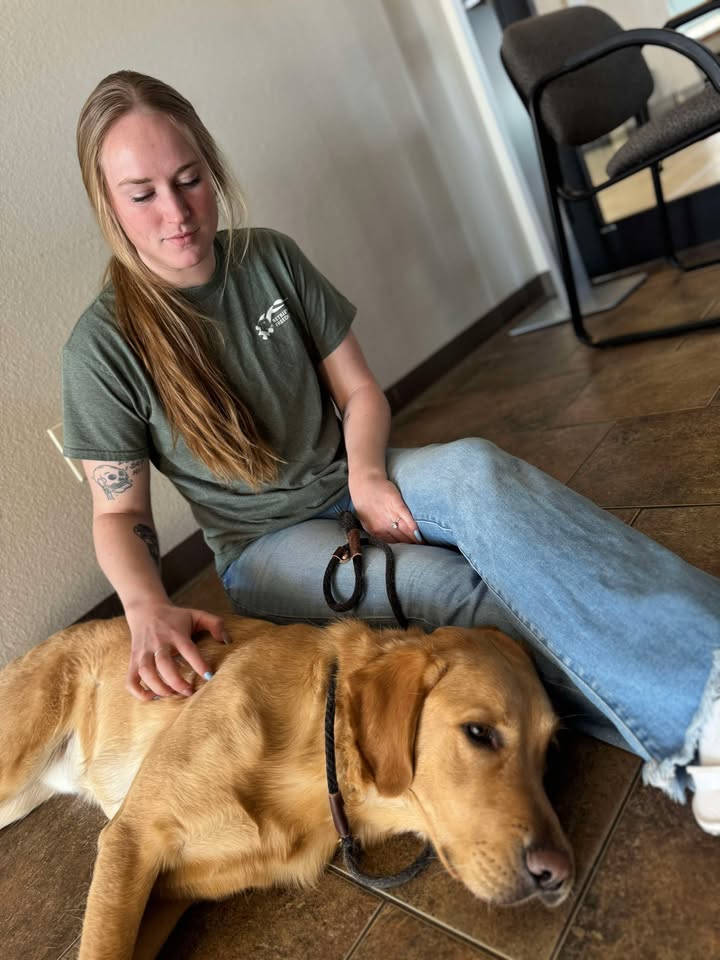Posted on: in [ General ]
What is Deep Pressure Therapy (DPT)?
Deep Pressure Therapy (DPT) is a calming technique that applies firm, gentle pressure to the body, similar to the sensation of a weighted blanket. Service Dogs trained in DPT offer support by using their body weight to apply pressure.
How Retrieving Freedom Service Dogs Perform DPT
A trained Service Dog can provide DPT in various ways, depending on the client's needs. All RFI Service Dogs are trained to perform the following tasks:
Visit
.jpg)
Visit is used while sitting. The dog puts its chin in the client’s lap for some light pressure and physical contact. Clients often pet the dog during this time which can help calm and ground them.
Paws
%20(2).png)
Paws is used while sitting in a chair. The dog drapes its front legs across client’s lap and has its body next to their chest offering moderate pressure and a greater amount of physical contact. Clients can pet or hug the dog, and having the dog in this position offers a buffer between the client and the activities around them.
Crash
%20(3).png)
Crash is used while the client is sitting on the floor, couch, or bed. The dog lies across the client’s legs or body, offering deep pressure and large amounts of physical contact.
Settle

Settle is used while sitting or lying down on the floor or bed. The dog will lie down next to the client’s legs or body offering contact and stillness. Clients can drape their arms over the dog for more contact or pet the dog which can help calm them.
Who Benefits from DPT?
For Veterans with PTSD
Veterans and others experiencing PTSD often struggle with anxiety, nightmares, and hypervigilance. According to the American Kennel Club, service dog placements were associated with a 66% reduction in PTSD diagnoses among veterans. A Service Dog’s DPT can help reduce physiological stress responses, lower heart rate, and provide a sense of safety (National Center for PTSD; American Kennel Club).
ldren with Autism
Children and adults with ASD may experience sensory overload, meltdowns, or difficulty with emotional regulation. DPT helps create a calming effect, easing tension and promoting relaxation (PubMed - National Library of Medicine; National Center for PTSD).
For Individuals with Anxiety
For those with generalized anxiety, panic attacks, or social anxiety, the presence of a Service Dog offering DPT can help manage overwhelming emotions and provide grounding during stressful situations.
For Those with Depression
Feelings of isolation and sadness can be alleviated by the constant companionship and physical connection that DPT provides.
For Individuals with Neurological Conditions
People with Traumatic Brain Injury (TBI) or other conditions that affect sensory processing may benefit from the deep, steadying pressure of a trained Service Dog.
The Science Behind DPT
Scientific studies have explored the physiological effects of Deep Pressure Therapy (DPT) and its impact on the parasympathetic nervous system. When a Service Dog applies pressure, several responses can occur:
-
Reduction of Cortisol Levels: Deep pressure stimulation may help decrease cortisol, the body's primary stress hormone. Research indicates that DPT can alleviate anxiety by reducing physiological arousal, which is often associated with elevated cortisol levels (PubMed - National Library of Medicine).
-
Increase in Serotonin and Dopamine Levels: The application of deep pressure is associated with the release of neurotransmitters such as serotonin and dopamine, which play roles in mood regulation and emotional stability. Studies have suggested that deep-pressure organized sensory input stimulates the release of these chemicals, contributing to decreased arousal and enhanced feelings of calm (PMC).
-
Slow Heart Rate and Breathing: Deep Pressure Therapy (DPT) has been shown to promote physiological regulation, including the slowing of heart rate. This effect is primarily due to the activation of the parasympathetic nervous system, which counterbalances the body's stress responses. By applying gentle, distributed pressure, DPT can help reduce heart rate, leading to a calming effect (Harkla).
-
Provision of Proprioceptive Input: Deep pressure provides proprioceptive feedback, enhancing body awareness and helping individuals feel more connected to their bodies and surroundings. This sensory input is beneficial for improving coordination and spatial orientation (Harkla).
DPT in Action: Real-Life Impact
For many Veterans with PTSD, a Service Dog trained in DPT can intervene during a nightmare or panic attack, grounding them before symptoms escalate. Similarly, a child with autism experiencing sensory overload can receive immediate relief from their Service Dog’s comforting weight (Davis et al., 2024).
DPT is one of the many ways our Service Dogs help change lives, providing comfort, reducing anxiety, and creating a new sense of freedom—proving once again that their impact extends far beyond companionship.
Learn More
Ready to experience the life-changing support of a Service Dog? Apply Today


0 comments